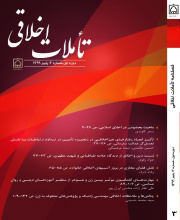
تأملات اخلاقی (Ethical Reflections)
تأملات اخلاقی دوره اول زمستان 1399 شماره 4 (مقاله علمی وزارت علوم)
مقالات
حوزههای تخصصی:
The concept of place is ultimately a matter of ethical significance—of where something fits in a nexus or structure of meaning. Often this meaning is quite personal, involving a sense of presence we associate with a place. This essay investigates this connection through a study of Wordsworth’s poem, “Tintern Abbey.” It argues that the notion of a presence-infused place is ultimately that of a second-personal space. Presence is a matter of second-personal openness. Therefore, when presence infuses place, it makes its space second-personal also.
Educating for Individual Freedom and Democratic Citizenship: In Unity and Diversity There Is Strength(مقاله علمی وزارت علوم)
حوزههای تخصصی:
This article addresses contentious questions concerning individual freedom and democratic citizenship education in the contemporary circumstances of multiculturalism. It suggests that educating children for civic equality is an ambitious aim for any democracy and not one that can ever be realized once and for all. It provides evidence that multicultural conditions can challenge the very aim of educating children for civic equality. It explains that democracies are variously multicultural and the varieties of groups make a difference in the kind of education and the progress toward civic equality that can realistically be expected at any time.
Are There Limits to Free Speech?(مقاله علمی وزارت علوم)
حوزههای تخصصی:
Freedom of speech has traditionally been a cause championed by the left and liberal side of the political spectrum, against conservatives who have tried to limit the expression of radical ideas. Here are three examples from the United States: 1) When I was appointed to Princeton University in 1999, Steve Forbes, whose father had endowed the university’s Forbes College, called for my appointment to be rescinded, and pledged that he would not donate to the university as long as I was on the faculty. Forbes was, at the time, running for the Republican nomination for president.
We Have to Live Till We Die(مقاله علمی وزارت علوم)
حوزههای تخصصی:
What ethical stance would be appropriate in today’s messy situation of health crisis, global warming, social and economic antagonisms, etc.? The first one is that of an expert who deals with the specific task imposed on him by those in power, blissfully ignoring the wider social context of his activity. The second one is that of pseudo-radical intellectuals who criticize the existing order from a comfortable morally superior position, well aware that their criticism will have no actual effects. How, then, are we to go on living after we get rid of the illusions of a false critical stance? Not just by accepting our reality: the fascination with the end of our civilization make us spectators who morbidly enjoy the disintegration of normality. A way out of this deadlock is signalled by a line from a song by the German rock band Rammstein: “we have to live till we die”. We have to fight against the pandemic and other crises not by way of withdrawing from life but as a way to live with utmost intensity. Is there anyone more ALIVE today than millions of healthcare workers who with full awareness risk their lives on a daily base? Many of them died, but till they died they were alive.
Interpreting Hobbes’s Moral Theory: Rightness, Goodness, Virtue, and Responsibility(مقاله علمی وزارت علوم)
حوزههای تخصصی:
The paper argues that the moral philosophy of Thomas Hobbes is unified by a complex conception of reason that imposes consistency norms of both rationality and reasonableness. Hobbes’s conceptions of rightness as reciprocity, and moral goodness as sociability belong to an original and attractive moral theory that is neither teleological nor classically deontological, nor as interpreters have variously argued, subjectivist, contractarian, egoist, or dependent on divine command.
ACKNOWLEDGING OTHERS(مقاله علمی وزارت علوم)
حوزههای تخصصی:
It is widely affirmed that human beings have irreplaceable valuable, and that we owe it to them to treat them accordingly. Many theorists have been drawn to Kantianism because they think that it alone can capture this intuition. One aim of this paper is to show that this is a mistake, and that Kantianism cannot provide an independent rational vindication, nor even a fully illuminating articulation, of irreplaceability. A further aim is to outline a broadly Aristotelian view that provides a more fitting theoretical framework for this appealing conception of human value. This critique of Kantianism extends to contemporary theorists with a broadly Kantian orientation, including Christine Korsgaard, Stephen Darwall and John Rawls. The problem with these views, at heart, is that they attempt to ground morality in respect alone. Yet it is love, not respect, that brings irreplaceability into view. The paper closes with a sketch of a virtue-theoretic theory that follows Aquinas in taking love to be a master virtue that refines the other virtues so as to ensure a continuous and practically efficacious sensitivity to the irreplaceable value of fellow human beings.